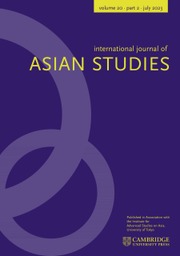THE NATURE OF SOCIAL AGREEMENTS (YUE) IN THE LEGAL ORDER OF MING AND QING CHINA (PART ONE)
Published online by Cambridge University Press: 30 June 2005
Abstract
The two most notable forms of law in the Ming and Qing periods were state law and private contracts. They were thought to exist separately, as the saying went: “The state has laws while individuals have private contracts.” Scholars have also held the same view; they have contrasted the two, defining the former as vertical, authoritative and a political tool to govern the state, and the latter as horizontal, voluntary and a tool to regulate economic activities of individuals. Social agreements that were instituted in order to maintain order in villages, however, had characteristics of both; on one hand they were contracts drawn up voluntarily by the villagers, but on the other hand, they also had the aspect of commands given by village leaders for ordinary members to observe. The opening section looks at studies that have been made on written law and private contracts. The following section examines how village compacts were instituted and how they were enforced. Three types of village compact are examined – village regulations, village compacts based on the Confucian moral code, and alliances connected with rent-resistance movements. Part Two will discuss the nature of coercive commands and voluntary contracts, both of which commonly coexisted in a unique mixture in village compacts, and will then expand the conclusion drawn from the discussion above to the level of the state, to present a new framework for understanding the relationship between statutory law and private contracts, and that between state authority and social power.
- Type
- LAW, STATE AND SOCIETY IN CHINA [3]
- Information
- Copyright
- © Cambridge University Press 2005
Footnotes
- 3
- Cited by


